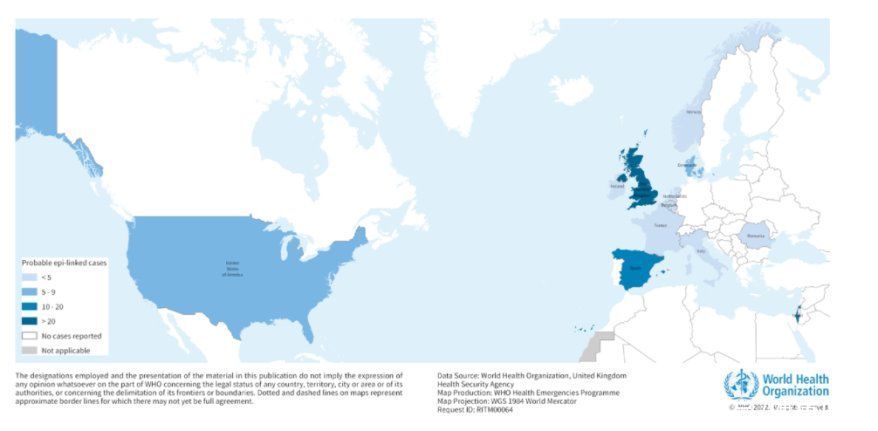(Health Times reporter Zhang He Tan Qixin) According to the latest WHO report, as of April 21, 169 cases of acute hepatitis of unknown cause in children have been reported in 12 countries around the world, including the United Kingdom, Spain, Israel, and the United States. Ages ranged from 1 month to 16 years, 17 patients received liver transplants, and at least 1 death occurred.
It has only been less than a month since the UK first reported 5 cases of unexplained hepatitis in children on March 31, and the cases of unexplained hepatitis in children seem to be “menacing”. What are the possible pathogenic factors of unexplained hepatitis in children? Does my country face import risks? How to prevent it?

As of April 23, the distribution of acute severe hepatitis cases of unknown cause by country.
The causative factor is still unclear, and attention should be paid to the possibility of a new type of adenovirus
“In general, acute severe hepatitis in children is more It is rare, and its etiology has not yet been determined. Although the current etiological analysis is the first to suggest the possibility of adenovirus infection, more investigations and research are still needed to confirm.” Research by Zhuang Hui, Department of Pathogen Biology and Infectious Disease Research Center, Peking University School of Basic Medicine The team wrote.
The common viruses that cause acute viral hepatitis (hepatitis A, B, C, D and E) are currently undetectable in 169 confirmed cases, according to WHO report , and adenovirus was detected in at least 74 cases. In addition, the novel coronavirus was found in 20 tested cases, and 19 people were infected with both novel coronavirus and adenovirus.
Adenovirus is a common virus that usually causes mild, self-limiting flu-like illness or gastrointestinal illness. “Increasingly, the information gathered by our investigations suggests that the increase in sudden-onset hepatitis cases in children is linked to adenovirus infection. But we are still investigating other potential causes.” Vaccine link, no one has been vaccinated against Covid-19 among confirmed cases in the UK under the age of 10.
However, Zhuang Hui’s research team suggested that although adenovirus was detected in some children in this epidemic, adenovirus infection generally causes the disease in immunocompromised people, and acute severe hepatitis is very common in children with healthy immune function. rare.
“It is imperative to determine the cause of these cases in order to further refine control and preventive measures. While adenovirus is currently a hypothesis for the underlying cause, it does not fully explain the severity of the current clinical situation. WHO pointed out that investigations need to focus on factors such as whether reduced circulating levels of adenovirus during the COVID-19 pandemic lead to increased susceptibility of young children, the possibility of novel adenoviruses, and co-infection of novel coronaviruses with adenoviruses.
Our country should be vigilant, but not panic
“We also need to be vigilant about unknown pathogens, even if this happens. The probability of a new infectious disease becoming a pandemic is not high.” On April 29, Zhang Wenhong, director of the Department of Infectious Diseases at Huashan Hospital Affiliated to Fudan University, commented on the WeChat public account “Huashan Infection”.
Zhang Wenhong pointed out that the unexplained hepatitis concerned by the WHO has the characteristics of clustered disease, and the incidence rate exceeds that of previous years. In this case, it is reasonable to consider the risk of infectious diseases. among. At present, it is speculated that children have not been exposed to this virus for a long time, and sudden contact will cause relatively serious immune damage. This speculation is consistent with the phenomenon that emerging infectious diseases tend to be heavier in the early stages of disease outbreaks of.
“If this is the cause, rather than a new virus that has not been discovered before, the follow-up effect of this unexplained hepatitis will gradually decline.” Zhang Wenhong said.
In fact, childhood hepatitis can be caused by a variety of reasons. According to information released by the Stanford Children’s Health Center, in addition to the common hepatitis viruses, the causes of hepatitis include cytomegalovirus, herpes simplex virus, chicken pox, adenocarcinoma Viruses, etc. may lead to the occurrence of liver inflammation in children.
On April 27, the Beijing Municipal Health Commission issued the “Notice on Strengthening the Treatment of Unexplained Hepatitis Cases in Children”, with the purpose of prompting relevant medical institutions to increase their vigilance and pay attention to children with unexplained hepatitis. If there is such a case, the cause should be identified as soon as possible and the treatment should be strengthened.
“Parents don’t need to panic, the number of cases reported in this outbreak is still small. Although some of the cases reported this time require liver transplantation due to liver failure, the clinical reasons are unknown. Liver failure is not uncommon.” Zhu Zhijun, director of the Liver Transplant Center of Beijing Friendship Hospital, said in an interview with a Health Times reporter.
An expert from Qingdao CDC, who did not want to be named, pointed out in an interview with a Health Times reporter that my country currently requires immunization programs for children with hepatitis B and A, and the incidence of childhood hepatitis in China is very low. Unexplained hepatitis, I have never heard of related cases in China, but as long as it is an infectious disease, regular measures such as frequent handwashing and attention to respiratory hygiene are still effective in preventing infection.
References:
1.WHO: Multi-Country – Acute, severe hepatitis of unknown origin in children.2022-04-23 https://www.who.int/emergencies/disease-outbreak-news/item/2022-DON376
2.UKSHA: Increase in hepatitis (liver inflammation) cases in children under investigation https://www.gov.uk/government/news/increase-in-hepatitis-liver-inflammation-cases-in-children-under-investigation#full-publication-update-history p>